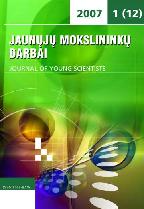A Knowledge-Based Society: Problems in Lithuania
A Knowledge-Based Society: Problems in Lithuania
Author(s): Renatas MorkvėnasSubject(s): Economy
Published by: VšĮ Šiaulių universiteto leidykla
Keywords: Learning society; Knowledge-based society brain drain.
Summary/Abstract: A knowledge-based society is a society based on people, their creativity, initiative and also their ability to study more systematically. Therefore, a knowledge-based society also means a learning society, with a higher demand of knowledge and more powerful instruments to meet this increasing demand. To cope with rapid change and new conditions created by information technologies, people should be able to continue learning throughout their lives. It is not enough to have trained elites to deal with this pace of change. This is not only a matter of growing potential, competitiveness and employability but it is becoming a matter of basic citizenship and civilization (UNESCO, 1998; Carneiro, 2001). Learning enables people to play a role in their community, family, neighborhood, workplace and public space. Learning is important not only increasing economic performance, but also enhancing participation in public life and enjoyment in sport or art. Moreover, the synergies among these different dimensions of life are increasing. Without a learning society, this transition to a knowledge-based society will create new and deep social divides. Solving the problems of a knowledge society Lithuania first of all needs: 1) To ensure access to information technologies for everyone; 2) To ensure lifelong learning for everyone; 3) To stop the brain drain process; 4) To ensure the application of knowledge in a knowledge system for general use. Research object: a knowledge-based society in Lithuania. Research objective: with reference to statistical researches to show the main problems of a knowledge-based society in Lithuania. Research tasks set out in order to achieve the objective: 1. The origin of a knowledge society and knowledge demand; 2. Brain drain and internet spread analysis; 3. Statistical analysis of the application of knowledge. Research methods applied: logical analysis and synthesis of scientific literature, systematic analysis of statistics, the methods of comparison and generalization. Research result: the article presents a current situation of a knowledge society and the knowledge economy in Lithuania. It has been proved that Lithuania has entered the stage of a knowledge society, as the research has established the demand for lifelong learning. Statistical analysis proves that Lithuania has brain drain and the Internet spread problems. The research has shown that the correlation between annual average wages and knowledge indexes is very strong.
Journal: Jaunųjų mokslininkų darbai
- Issue Year: 2007
- Issue No: 1(12)
- Page Range: 145-149
- Page Count: 5
- Language: English

